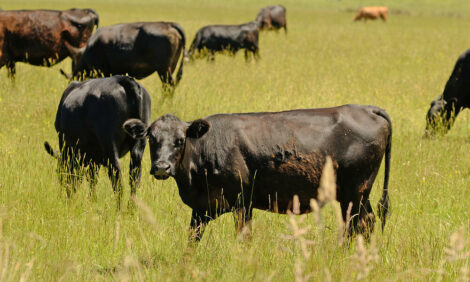



UK Beef Carbon Footprint Is EU Average
UK - Retailers can be assured that the carbon footprint of beef produced in the UK is almost exactly the EU average – and almost four times less than beef imported from Brazil, the National Beef Association has said. This follows publication of an authoritative EU study on greenhouse gas emissions (GHGs) that fundamentally contradict the contentious findings of a report by the Food and Agriculture Organisation (FAO), “Livestock’s Long Shadow” – which was released in 2006.
Back then the FAO, which has since corrected its conclusions, was claiming that the world’s livestock were responsible for 18 per cent of GHG’s – which was a higher share than transport.
Unfortunately its flawed analysis was accepted by a number of influential policy makers including former chief medical officer, Sir Liam Donaldson, who claimed that the red meat component in the UK diet was warming the planet.
It was also seized on by the UK’s Centre for Alternative Technology (CAT) which last year called for an 80 per cent cut in the UK’s livestock numbers so that carbon reduction targets set for 2030 could be achieved.
“Retailers are extremely conscious of the public mood and damage created by the FAO’s defective report that still lingers in consumer consciousness and can be repeated by some media commentators even today,” explained NBA director, Kim Haywood.
“The NBA would like to draw supermarket attention to a study, just published, by the EU Commission’s Joint Research Centre which painstakingly covers important areas which were overlooked by the FAO and not surprisingly draws a much more reassuring conclusion.”
“Its ‘Evaluation of the livestock sector contribution to EU Greenhouse Gas Emissions’ has assessed the full net carbon emission of a range of livestock products by taking into account the carbon contribution of animal feed not produced in the EU as well as mineral fertilisers, pesticides, energy, and land used to produce additional feed.”
“This all embracing, life cycle analysis, demonstrates that UK beef has a carbon footprint of 23 kg carbon dioxide equivalents per kilo. This is almost exactly level with the EU average of 22.1kg carbon dioxide equivalents per kg beef.”
“But more importantly the carbon footprint of Brazilian beef is estimated to be a massive 80 carbon dioxide equivalents per kilo of beef when the impact of land use change, the removal of rain forest and other original ground cover, is fully considered.”
“And even if land use change is not taken into account Brazil’s beef carbon footprint is 48 kilos, much more than twice the EU average, because of the lower productivity of its beef production.”
“The NBA continues to be concerned that the flawed notion that livestock farming in the EU, and global warming, are irretrievably connected has become embedded in UK thinking and hopes this EU report helps to convince supermarkets that the efficient production of beef in the UK provokes no cause for alarm.”
“Indeed extensive beef production, using permanent pasture, is carbon efficient because 72 per cent of the UK land mass grows high quality grass that can only be eaten by cattle or sheep. It also stores carbon which would otherwise be released if the land was cultivated to produce other food staples,” Ms Haywood added.
TheCattleSite News Desk


